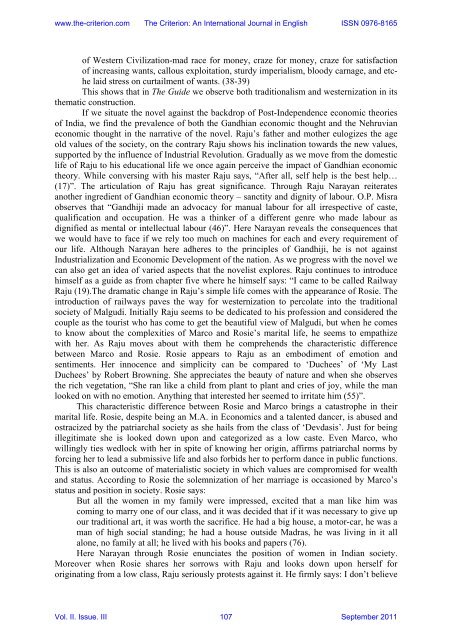Vol. II. Issue. III September 2011 - The Criterion: An International ...
Vol. II. Issue. III September 2011 - The Criterion: An International ...
Vol. II. Issue. III September 2011 - The Criterion: An International ...
Create successful ePaper yourself
Turn your PDF publications into a flip-book with our unique Google optimized e-Paper software.
www.the-criterion.com <strong>The</strong> <strong>Criterion</strong>: <strong>An</strong> <strong>International</strong> Journal in English ISSN 0976-8165<br />
of Western Civilization-mad race for money, craze for money, craze for satisfaction<br />
of increasing wants, callous exploitation, sturdy imperialism, bloody carnage, and etche<br />
laid stress on curtailment of wants. (38-39)<br />
This shows that in <strong>The</strong> Guide we observe both traditionalism and westernization in its<br />
thematic construction.<br />
If we situate the novel against the backdrop of Post-Independence economic theories<br />
of India, we find the prevalence of both the Gandhian economic thought and the Nehruvian<br />
economic thought in the narrative of the novel. Raju’s father and mother eulogizes the age<br />
old values of the society, on the contrary Raju shows his inclination towards the new values,<br />
supported by the influence of Industrial Revolution. Gradually as we move from the domestic<br />
life of Raju to his educational life we once again perceive the impact of Gandhian economic<br />
theory. While conversing with his master Raju says, “After all, self help is the best help…<br />
(17)”. <strong>The</strong> articulation of Raju has great significance. Through Raju Narayan reiterates<br />
another ingredient of Gandhian economic theory – sanctity and dignity of labour. O.P. Misra<br />
observes that “Gandhiji made an advocacy for manual labour for all irrespective of caste,<br />
qualification and occupation. He was a thinker of a different genre who made labour as<br />
dignified as mental or intellectual labour (46)”. Here Narayan reveals the consequences that<br />
we would have to face if we rely too much on machines for each and every requirement of<br />
our life. Although Narayan here adheres to the principles of Gandhiji, he is not against<br />
Industrialization and Economic Development of the nation. As we progress with the novel we<br />
can also get an idea of varied aspects that the novelist explores. Raju continues to introduce<br />
himself as a guide as from chapter five where he himself says: “I came to be called Railway<br />
Raju (19).<strong>The</strong> dramatic change in Raju’s simple life comes with the appearance of Rosie. <strong>The</strong><br />
introduction of railways paves the way for westernization to percolate into the traditional<br />
society of Malgudi. Initially Raju seems to be dedicated to his profession and considered the<br />
couple as the tourist who has come to get the beautiful view of Malgudi, but when he comes<br />
to know about the complexities of Marco and Rosie’s marital life, he seems to empathize<br />
with her. As Raju moves about with them he comprehends the characteristic difference<br />
between Marco and Rosie. Rosie appears to Raju as an embodiment of emotion and<br />
sentiments. Her innocence and simplicity can be compared to ‘Duchees’ of ‘My Last<br />
Duchees’ by Robert Browning. She appreciates the beauty of nature and when she observes<br />
the rich vegetation, “She ran like a child from plant to plant and cries of joy, while the man<br />
looked on with no emotion. <strong>An</strong>ything that interested her seemed to irritate him (55)”.<br />
This characteristic difference between Rosie and Marco brings a catastrophe in their<br />
marital life. Rosie, despite being an M.A. in Economics and a talented dancer, is abused and<br />
ostracized by the patriarchal society as she hails from the class of ‘Devdasis’. Just for being<br />
illegitimate she is looked down upon and categorized as a low caste. Even Marco, who<br />
willingly ties wedlock with her in spite of knowing her origin, affirms patriarchal norms by<br />
forcing her to lead a submissive life and also forbids her to perform dance in public functions.<br />
This is also an outcome of materialistic society in which values are compromised for wealth<br />
and status. According to Rosie the solemnization of her marriage is occasioned by Marco’s<br />
status and position in society. Rosie says:<br />
But all the women in my family were impressed, excited that a man like him was<br />
coming to marry one of our class, and it was decided that if it was necessary to give up<br />
our traditional art, it was worth the sacrifice. He had a big house, a motor-car, he was a<br />
man of high social standing; he had a house outside Madras, he was living in it all<br />
alone, no family at all; he lived with his books and papers (76).<br />
Here Narayan through Rosie enunciates the position of women in Indian society.<br />
Moreover when Rosie shares her sorrows with Raju and looks down upon herself for<br />
originating from a low class, Raju seriously protests against it. He firmly says: I don’t believe<br />
<strong>Vol</strong>. <strong>II</strong>. <strong>Issue</strong>. <strong>II</strong>I 107 <strong>September</strong> <strong>2011</strong>
















